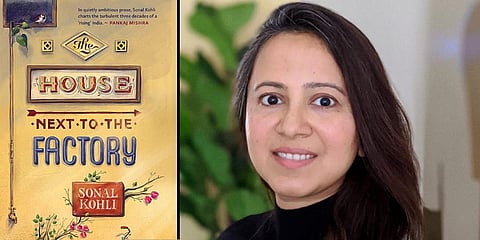

Sonal Kohli makes an ambitious and confident debut with her collection of short stories, The House Next to the Factory, which makes for a wonderfully textured and satisfying reading experience. Set sometime between 1980 and 2010, these nine inter-connected stories focus on not just the inhabitants of the eponymous house which consists of a post-Partition immigrant family but the lives that are touched by theirs as well. In the process, it explores the potent forces of culture, community, circumstances as well as the crisis of identity with an insightful gaze.
Good short fiction is characterised by blank spaces that leave much to the imagination and dark voids that succeed in captivating the reader while often leaving them confounded with the mysteries of ambiguity and lack of resolution. An interlinked collection of stories such as this one with its fragmentary format and episodic narrative style does not hew to a particular template but lovingly builds a world packed with intricate detail and characters who are bursting with life just like in a novel but without the overarching unified plot. Thus Kohli, by borrowing from the best techniques of short and long form fiction manages to create something unique that feels organic and true to the lived human existence in all its multihued and sordid splendour.
Kavya, who is not always the protagonist, seems stifled by the strictures within the suffocating confines of the house but she is not without the gumption to strike out on her own or rebel against the expectations that weigh her down. She sets out in search of a nun. Originally, a senior who had the same bus route, she becomes Sister Celina before returning to her old life. Kavya has heard the scurrilous theories spun out seeking to explain the ex-nun’s decisions but she goes in search of answers or just the chance to re-connect making it a personal odyssey which just leaves her with even more questions than she set out with in the first place.
A well-loved tuition teacher whose students include Kavya’s brother and cousin is struggling to pick up the pieces of his life after a personal loss when his world is almost shattered again in the aftermath of the anti-Sikh riots. An aunt of hers moves to England but her heart remains with a good friend who encouraged her writing and is heartbroken over the loss of her unborn child. Her grandmother has survived the Partition and is fortunate to witness her family’s fortune grow in leaps and bounds thanks to her sons who are called the Steel Brothers, but her poor friend is not so lucky in life or love.
Kavya’s mum’s relatives have a man Friday who has found comfort in the arms of a lower caste widow but will this newfound happiness be snatched away from him because his life is subject to the whims of his employers? The Steel Brothers buy a house from a mother and daughter who are struggling to make ends meet after the loss of the man of the house and have done well by themselves and their family but everything seems to hang by a thread. Kavya and her lover have drifted apart and find themselves in Paris and Landour respectively as they continue to grapple with chequered pasts burdened with history and a future in flux owing to the grievances of a precarious present.
The charm of these stories lie in their stubborn refusal to fit into any particular format. Rather, each tale meanders along whimsically staying faithful to its own demands and ending of its own volition. The stripped down prose is effective and instrumental in guiding the delighted reader into the inner lives of these characters. A lesser writer would have tried to cram in exposition but Kohli is that rare talent who exercises remarkable restraint to let each story just be, thereby amplifying the magic considerably, pulling off something truly special.
The House Next to the Factory
By: Sonal Kohli
Publisher: HarperCollins India
Pages: 196
Price: Rs 499